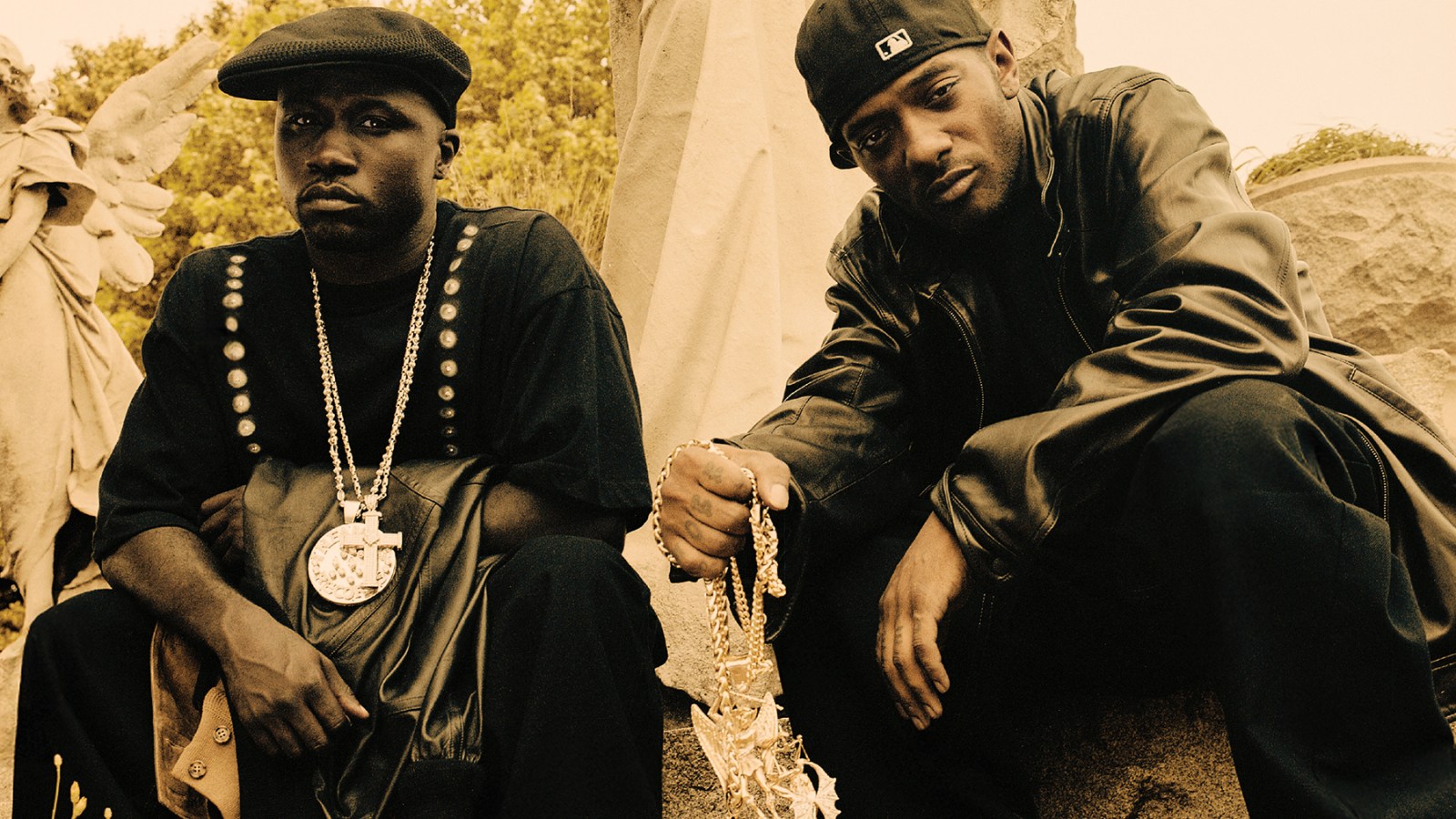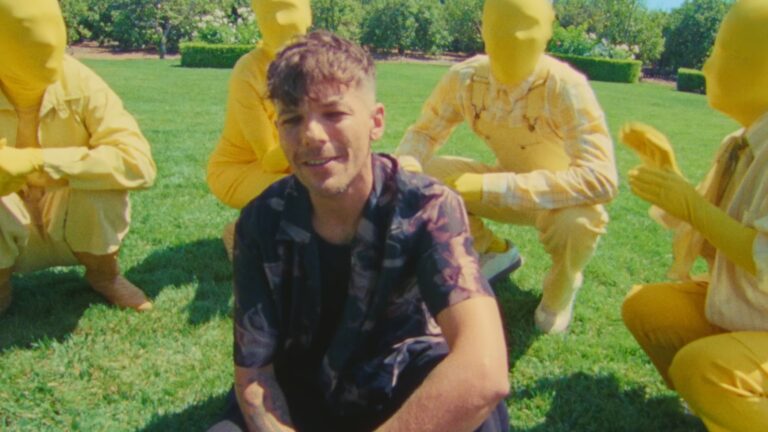Havoc is moving and shaking on a crisp October afternoon, heading into our interview in a SiriusXM greenroom right after talking to DJ Whoo Kid at the radio conglomerate. Wearing a camo hoodie and pants with a black shirt, he greets me with a handshake, then intently checks his phone before settling into our conversation. It’s the eve of the release of the final Mobb Deep album, Infinite, and he’s likely finalizing the star-studded afterparty, which later included Infinite contributors Alchemist, Nas, and Raekwon (as well as a DJ set from Kid Capri and a powerful Busta Rhymes speech).
After starting his weekly The Infamous Hour at on SiriusXM’s Shade45 station—where he plans to play music, tell stories, and interview peers every Sunday at 3 p.m. ET—he has more carte blanche than usual in their Midtown offices. Alongside his recent radio turn, and prepping a cannabis shop in Queens, Havoc’s been busy with joint projects like GUTT with RJ Payne and Ras Kass, as well as Wreckage Manner with Styles P. And for the past year plus, he’s been working with The Alchemist to craft the recently released Infinite, culling through unreleased verses from the late Prodigy, who died at 42 in 2017. The project is the latest from Mass Appeal’s Legend Has It… series.
When I ask Havoc if this prerelease day feels any different with a Mobb Deep release, he quickly says, “Nah, it don’t feel no different,” before admitting, “I mean, yes, a little bit different. I can’t lie. Releasing a Mobb Deep project without Prodigy being here definitely feels different.”
As Mobb Deep, he and his late brother-in-rhyme Prodigy created one of rap’s most revered catalogs. After their Juvenile Hell debut commercially underwhelmed, their sophomore album The Infamous ingrained them into hip-hop culture with foundational records like “Shook Ones Pt. II” and “Survival of the Fittest.” They crafted a signature sound of hard drums over samples that could be soulful or gritty—but entrancing either way—providing a blueprint for future East Coast rappers. From there, they dropped canonical projects like Hell on Earth and Murda Muzik, with their last traditional release being 2014’s The Infamous Mobb Deep.
Their work outside Mobb Deep further bolsters their importance to hip-hop: Havoc produced Jadakiss’ “Why,” Biggie and The LOX’s “Last Day,” and contributed to Kanye West’s The Life of Pablo, while Prodigy dropped 1999’s H.N.I.C. and dozens of other projects that made him a solo force. Prodigy’s Return of the Mac with The Alchemist helped spark the latter’s run of rapper-producer collaborations, which opened an entire lane of creative partnerships in rap. Their impact is indelible—which is why, after Prodigy’s death, fans were devastated not only by his loss, but by the possibility that there would be no more Mobb Deep music.
Both Havoc and The Alchemist, who contributed to Mobb Deep’s albums after Murda Muzik, assured fans that they would comb through Prodigy’s vault and craft one final album. After promising the project for several years, production finally commenced about a year ago at The Alchemist’s L.A. studio, alongside Prodigy’s daughter, rapper-producer Santana Fox, and various close Mobb Deep affiliates.
Prodigy may no longer be here physically, but this project represents the best-case scenario for a posthumous album. Havoc says they built each song from Prodigy’s verses and hooks, arranging them atop production that upholds the classic Mobb Deep aesthetic. Without Prodigy even being here, he still guided Infinite’s thematic direction. These aren’t stitched-together, bottom-barrel verses—they sound like missives from beyond.
On verses where Prodigy raps, “I lived a full life, don’t cry for me” on the Nas-featured “Pour the Henny,” or opens “Clear Black Nights” by noting, “Lookin’ for me? Just look up in the sky on them clear black nights. You see me?” it feels like he anticipated the possibility of a posthumous project. He was always open about his battle with sickle-cell disease, most notably on H.N.I.C.’s “You Can Never Feel My Pain.” Even beyond the grave, his sense of purpose pours through Infinite. This is their ninth album; people into numerology—like Prodigy—view nine as a number of completion. If this is the last Mobb Deep album, Infinite is fully worthy of their legacy.
Since Prodigy’s passing, how often were you making beats that had that Mobb Deep energy?
Man, all the time, every day. I have beats that you wouldn’t even know I made because they’re not in that Mobb Deep vein. But when it came to making the Mobb Deep album, I had to keep it in that same vein. I don’t want to stray outside my foundation, because my foundational fans are really important to me, and this one is for them. I’m not trying to gain new fans. I’m trying to stick to the formula with Mobb Deep. It’s the last album, and I don’t think I’d be doing Mobb Deep any justice if I went outside that.
Of the songs that made Infinite, how many were originally for the Mobb Deep project you were working on years ago?
None of them, actually. Everything I got was brand new to me—stuff I never had before—that I got from Prodigy’s family. I took those and started working on the album.
I talked to Alchemist a couple of weeks ago about y’all kicking off the project in L.A. What was that like from your vantage point?
For me, it was good to step outside my comfort zone—my crib, my studio—to kick it with Al and get a little bit of new energy. Just to kick it off with him, vibe, and see where his head was at. That was important to me, to set it off that way.
How involved was Prodigy’s daughter, rapper Santana Fox, in the project?
Early on, she was involved—being there, making sure we were doing right by her pops, and rightfully so. She was around when we first started breaking ground on the album at Alchemist’s crib in L.A., just playing songs, letting her hear them, getting her blessings.
Prodigy has a lot of eerie lines on the album, such as “Look for me up in the sky on those clear black nights.” Where do you think bars like that came from?
I think he was full of premonitions. Maybe he felt like he wasn’t going to be here as long as the rest of us, and he was expressing those views. It really took me aback—it kind of blew my mind and made me a little sad too, kinda sentimental. But that was Prodigy.
Do you remember the first line like that that really took you aback?
When he was like, “I’ve lived a full life. Don’t cry for me,” as if he knew we’d be listening to this one day when he was gone. That’s crazy to me. I always bug out hearing that line. It never gets old.
Prodigy was deeply into esoteric knowledge and the paranormal. How often did y’all talk about things like that?
We talked about that all the time. That was one of our deep connections, among other things. He was more public with it than me—I was behind the scenes with it—but we’d have deep conversations for hours. That was a regular thing between me and him.
Clipse are on the album on “Look at Me.” Did you ever have previous plans to work with them or Pusha as a soloist?
I always hoped one day I’d do a song with them. We didn’t particularly have it planned, but when we started working on the album and thinking about features, Clipse were the first group that came to mind. We never did anything with them before, so we thought it’d be a dope combination. The Clipse are a group we highly respect. I know Prodigy respected them. We have a lot of admiration for them.
Was that one where they sent the verses over?
Yeah, it was kind of like that. I wasn’t in the studio with them. Technology is dope like that—but not dope at the same time, you know what I mean? Sometimes you want to be in the studio with the artists and vibe, but schedules conflict. So it’s cool when you can get the verses. When we tapped them for the collab, it was no question. They sent it right away. I really appreciate them for that. And later on, I got on the phone with Pusha and had a real good conversation with him. Shoutout to the Clipse.
How did “Pour the Henny” with Nas come together?
That was a track I had for a while. I’d been trying to get Nas on that song for two years. But Nas is busy—how many albums has he dropped in two years? He had so many. But I never gave up hope on getting him on the song, and eventually, when he had time, he did it.
Were y’all really waking up at 7 p.m. every day like Prodigy says on “Taj Mahal”?
No. [Laughs.] That’s a Prodigy move right there. I’m an early bird—I wake up early. But Prodigy, man, he could sleep all day. That was P for you—nocturnal for sure.
So you and Raekwon are about to go on your joint 30th anniversary tour. When was your last national tour?
A long time ago. I rarely tour in the States because, for some reason, the fans don’t come out like they do overseas. I see fans get upset, like, “You’re not performing in the States?” But when we book a tour, it’s like, where you at? When we do Europe, it’s sold out almost every show. But this time around, the enthusiasm seems to be there from the fans’ perspective, so we’re going out.
I feel like they have a deeper appreciation for the essence of the culture—more so than us, who focus on numbers and hype and shit like that.
In Europe, they’re curators. That’s where all the famous art was made—the Mona Lisa, the classical music—and they still have that today. The artwork, the Louvre. I believe it’s embedded in them, because they did that with jazz music. When jazz musicians felt played out over here, where’d they go? Europe. They treated them like kings. So this isn’t new. Europe’s always been that place where, when the U.S. gets tired of you, they say, “Bring us your artists.”
I saw you did The Infamous Live album with Benny Reid. Can you tell me about crafting it?
Benny hit me up. He expressed the appetite to do this album, and I was like, “Yo, this shit sounds dope.” I hooked up with him, went to his crib—he’s playing all these instruments. I’d sit there and advise him on how to compose. I don’t play many instruments—that’s more his forte—but it was dope.
I’ve seen Chief Keef and Rick Ross do orchestral shows. Would you be open to things like that in the future?
Hell yeah. One day, you’re definitely going to see that. That’s something I’ve been wanting to do before everybody else did it. Now everybody’s done it, so it’s nothing new—but I had that idea 20 years ago. It’s definitely something coming in the near future.
Do you have plans to do a book, biopic, or documentary—something to chronicle your life?
Definitely. For sure. That’s definitely in the mix. A Mobb Deep documentary, Havoc documentary—one or the other, for sure.
Can you tell me about your Dirty P album with Method Man?
The Method Man album’s coming real soon. We call that our COVID album because we’ve been working on it so long. It’s almost done. That’s going to be coming out hopefully by the end of this year, or next year.



